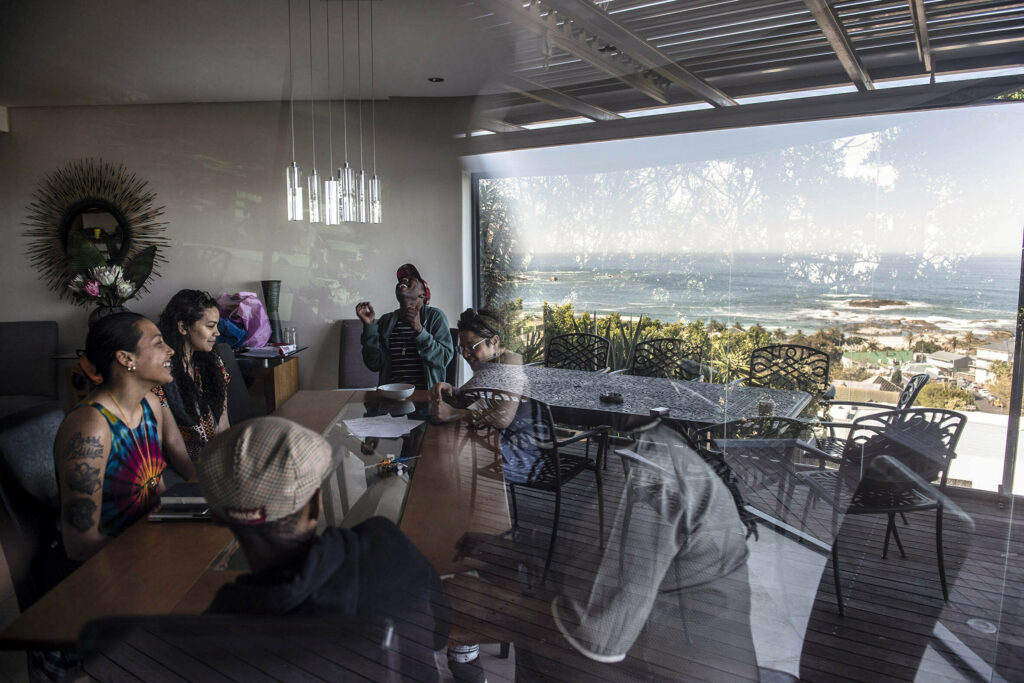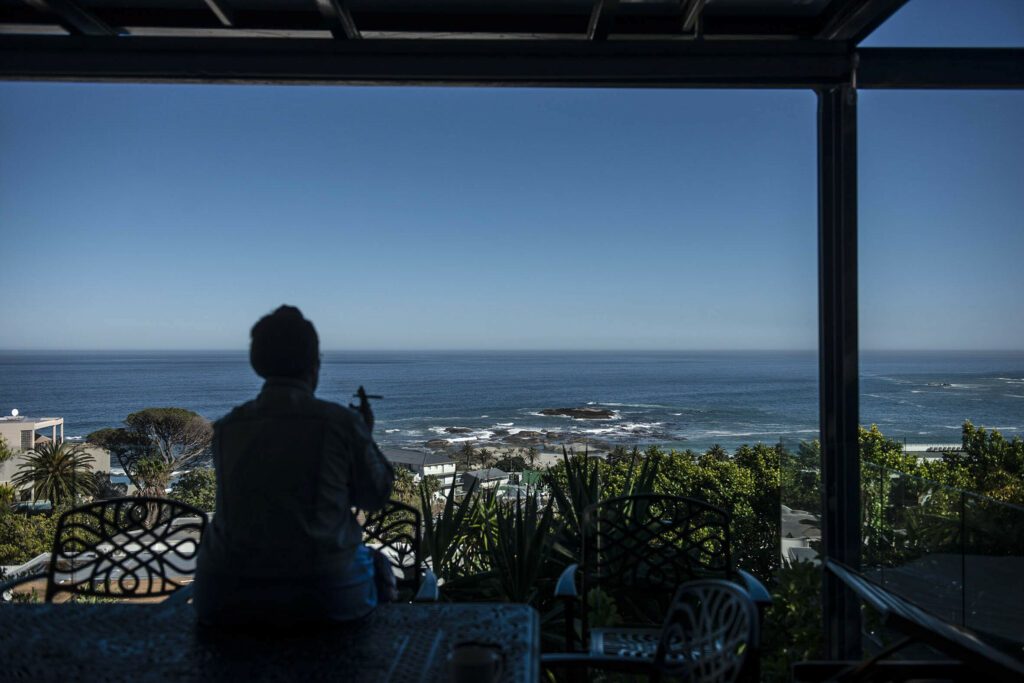Camps Bay home where housing activists are staging a protest. (David Harrison/M&G)
From outside there’s not much to write home about. The exterior of the five-bedroom Camps Bay home, tucked at the end of a cul-de-sac near a dog park, fits right in with the other suburban homes on the quiet street.
But once the large electronic gates open, it’s a sloping walk toward the home surrounded by lush vegetation. What looks like a standard double-storey building turns out to sink down a cliff for an added level of living space, a deck, and a pool.
Advertised on short-term rental sites such as Airbnb and booking.com, a weekend here costs R16 000. A blurb on one of the sites describes it as a “homely 5-bedroom holiday villa surrounded by a lush forest garden and with magnificent views over the Atlantic Ocean. It boasts a sun deck, outdoor pool and hot tub”.
An occupying group calling themselves an “art collective of queer black and coloured activists from the working and middle class” are currently calling the space home. They say it’s an occupation in solidarity with landless people and economic inequality made worse by the coronavirus and subsequent lockdown.
The group includes writers, photographers, filmmakers and social justice activists.
 (David Harrison/M&G)
(David Harrison/M&G)
“Camps Bay, Clifton, Sea Point is on this prime strip of land that the majority of people will not have access to and will never own property here. So we don’t want to fight with the state, because we know the government is captured, but we do want to occupy spaces that are firstly unoccupied, and secondly, spaces we are told is not for us,” says the collective’s spokesperson, Xena Ness.
The group said its access point to the house was to rent it through a rental website. Once inside, and after several days, they told the rental agent about their protest, and that they would not leave.
“We’ve been in touch with the agency and the property managers. We’d like them to put us in touch with the owner directly. We don’t want to talk through property management companies. We chose this property because it feeds into the profile of rich, foreign ownerships, […] the 0.05% of our society that is high net-worth individuals,” Ness said.
Inside, the home looks like a lived-in digs comprised of students or young professionals. Laptops lie strewn on couches. Some cleaning and coffee making is under way in the kitchen. Outside on the deck, with an almost 180-degree view of the Atlantic Ocean, an ashtray is filled with cigarette stubs — an indication of the stressful time they are having, some of the occupants say.
The only sign that the seven occupiers won’t be leaving voluntarily is a rope, tied to a kitchen door, fastened to a kitchen counter. A generator has pride of place close to the communal meeting table. Next to it is a jerry can of petrol. This is in case the electricity supply is cut.
The occupation of the holiday home comes weeks after a Cape Town high court judgment about evictions during the lockdown. It also follows protests where housing activists have drawn attention to the impact of the lockdown on people’s ability to pay for their rent and accommodation.
The Camps Bay collective say it’s in this spirit that they are drawing attention to the vast economic and moral disparity between those who have no form of formal housing, and those who are rich enough to afford more than one.
 The group performs an exercise on the balcony of the Camps Bay house where they are staying through AirBnB. (David Harrison/M&G)
The group performs an exercise on the balcony of the Camps Bay house where they are staying through AirBnB. (David Harrison/M&G)
“Our goal is highlighting the historical imperatives of this land, and there are many other areas, like Constantia, particularly in the Western Cape. There is the legacy of colonisation, apartheid, and even now, where people are still being displaced from the land… We are not attacking private ownership. We are not saying people can’t own private property. What we are calling into question is what this private ownership looks like. Who it excludes, who it oppresses, and who it doesn’t,” Ness said.
Asked how long they intend on staying and what would happen if they needed to replenish supplies without them being prevented from reentering, the group said they had “comrades who would help”.
The Mail & Guardian understands the home’s owner at first took a sympathetic approach to the occupation. But in a statement, Turnkey 365 Property Management has given the group until the end of the week to vacate the house.
 (David Harrison/M&G)
(David Harrison/M&G)
“The guise under which the guests secured the booking has not only been dishonest, but their indefinite occupancy and refusal to allow staff onto the property has led to many staff unable to perform their duties, resulting in a further compromise on their livelihoods and ability to support their families. In addition, much-needed future bookings are being compromised, resulting in a further setback for a small company already suffering and attempting to recover from the throes of Covid-19,” said the company’s Gabi Van Wyk.
“Our staff and their families have already suffered enough during these extraordinary circumstances and while we understand and respect the group’s cause and belief, we are not in the position to negotiate or facilitate their stay longer than already communicated contractually without seeing severe impact on our employees, which are as vulnerable as the group,” Van Wyk said.